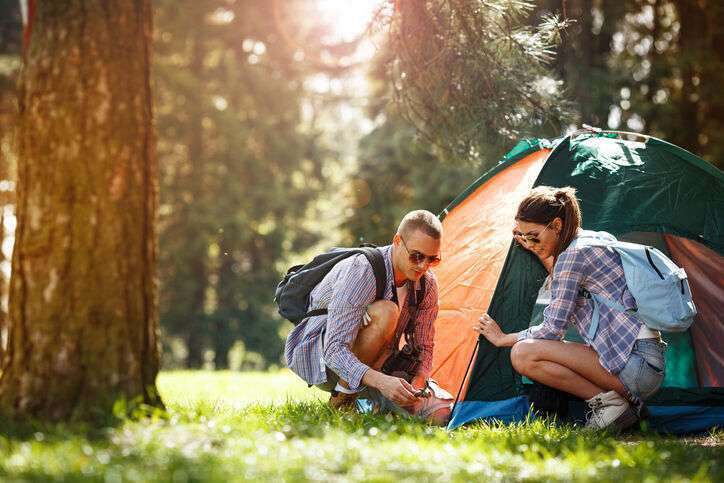Camping is all about enjoying the simple things in life and relaxing in nature, so in an ideal world, it shouldn’t be stressful to plan for a trip. But it can be a bit of a challenge for a beginner to know where to start.
Jeff Carter, a camping expert, says it doesn’t have to be stressful, though there are a few tips and tricks that all campers should know before embarking on a trip.
Carter, serves as the director for the Rockbrook Camp for Girls, a summer camp located in North Carolina, and says that one of the most exciting parts of camping is seeing wildlife. But campers should never interact with any wildlife they encounter up close.
“It’s tempting to want to get closer to it, but that’s very unwise,” he says. “Don’t try to interact with any wildlife.”
Carter explains there are two different types of camping beginners might undertake. One involves packing a backpack and hiking out to a campsite and only being able to utilize what can be carried. The other involves driving to a site and being able to access items in their car, which he refers to as “car camping.”
“When you’re car camping, you don’t have to think about how much you’re bringing, so you can overpack easily, and you can bring plenty of water, plenty of food, folding chairs and firewood because weight doesn’t matter,” Carter says.
Because of the ability to pack additional items that will bring comfort, car camping is especially ideal for families with children, according to Carter.
“Little children aren’t so interested in the remote areas,” Carter says. “They want to play with their flashlight and their stuffed animal, and they want a lot of the comforts that they have at home, but you’re still having that cool experience of being outside.”
When it comes to camping with kids, it’s important to have the right clothing packed, so campers need to take the weather into consideration, the layers needed as a result, as well as sun exposure.
“You also want to have something to do for the kids,” Carter says. “It’s not like grown-ups, where you’re happy to sit around, drink a beer and have a conversation. Kids will want to explore and go on additional day hikes or play a game. You have to be ready with something in mind to do with kids.”
All of the essentials that campers need to pack fall under two categories, according to Carter: food and shelter.
“The first thing you need to think about is ‘Where am I going to sleep?’ So most of the time, you’ll have a tent,” Carter says, adding that campers also should bring along a sleeping bag and a pillow.
He also recommends bringing along an air mattress, or other pad, that will help cushion a camper while they’re sleeping.
“That makes the night go much better because the ground, obviously, is a lot harder than your bed,” Carter says.
When it comes to cooking, Carter recommends bringing along a camping stove, as well as utensils, cups, pots and pans.
“There’s lots of one-pot meals you can make while you’re camping,” Carter says.
In addition to making sure campers have enough food, it’s just as important to have enough fluids as well, and a first-aid kit is a must.
While there is a lot of prep work to be done before a camping trip and while on it, Carter says it’s ultimately worth it.
“You’re going to be immersing yourself in nature and expanding what you know,” he says. “The greatest thing is you’re getting these sensations you can’t get anywhere else.”
